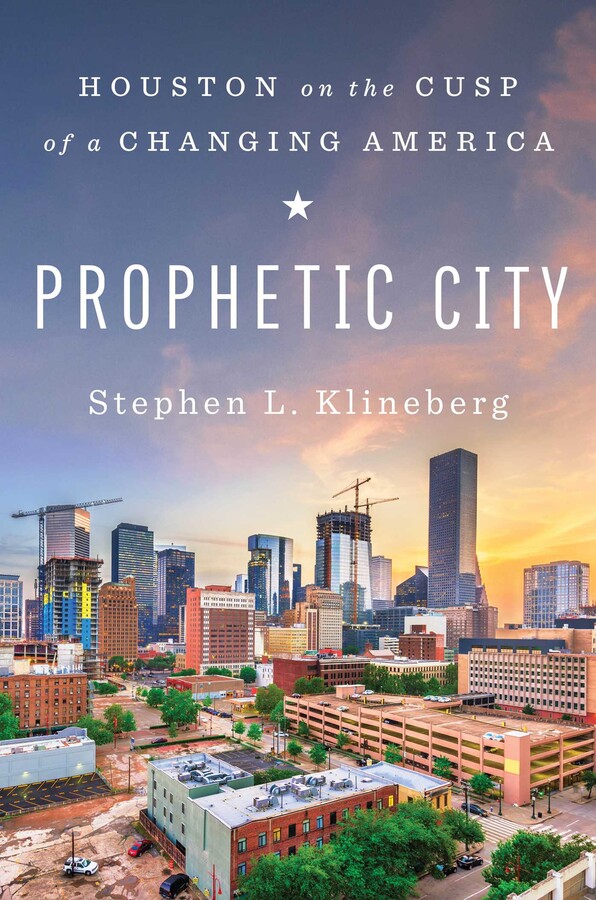Plus get our latest book recommendations, author news, and competitions right to your inbox.
Table of Contents
About The Book
Houston, Texas, long thought of as a traditionally blue-collar black/white southern city, has transformed into one of the most ethnically and culturally diverse metro areas in the nation, surpassing even New York by some measures.
With a diversifying economy and large numbers of both highly-skilled technical jobs in engineering and medicine and low-skilled minimum-wage jobs in construction, restaurant work, and personal services, Houston has become a magnet for the new divergent streams of immigration that are transforming America in the 21st century. And thanks to an annual systematic survey conducted over the past thirty-eight years, the ongoing changes in attitudes, beliefs, and life experiences have been measured and studied, creating a compelling data-driven map of the challenges and opportunities that are facing Houston and the rest of the country.
In Prophetic City, we’ll meet some of the new Americans, including a family who moved to Houston from Mexico in the early 1980s and is still trying to find work that pays more than poverty wages. There’s a young man born to highly-educated Indian parents in an affluent Houston suburb who grows up to become a doctor in the world’s largest medical complex, as well as a white man who struggles with being prematurely pushed out of the workforce when his company downsizes.
This timely and groundbreaking book tracks the progress of an American city like never before. Houston is at the center of the rapid changes that have redefined the nature of American society itself in the new century. Houston is where, for better or worse, we can see the American future emerging.
Product Details
- Publisher: Avid Reader Press/Simon & Schuster (July 1, 2020)
- Length: 336 pages
- ISBN13: 9781501177910
Browse Related Books
Raves and Reviews
“Essential . . . A long overdue urban biography . . . Engaging and accessible.” —The Houston Chronicle
"A trailblazing study . . . Klineberg supports his case with a wealth of survey research, interviews with experts, and user-friendly graphs, all of which make this book invaluable for anyone seeking a deep understanding of an underappreciated city. A unique blend of analysis and research that is likely to become a classic work of scholarship on Houston." —Kirkus (starred review)
“A fascinating portrait of Houston . . . A must-read, highly recommended sociological perspective of America’s future.” —Library Journal (starred review)
"A detailed, accessible portrait of the changing face of Houston." —New Yorker
“[A] layered, nuanced history of this ever-evolving city.” —Texas Observer
"Klineberg’s meticulous research makes a strong case that Houston, with its growing inequalities, demographic shift to a nonwhite majority, and rising social and environmental consciousness, is at the forefront of America’s future. This eye-opening and accessible study deserves a wide readership." —Publishers Weekly
"An excellent new book on Houston . . . Particularly well-timed to our current moment . . . What Klineberg does beautifully in this book is to show that the challenges that Houston is grappling with today will be the challenges that the rest of us will be facing tomorrow." —Inside Higher Ed
“It’s a relief to read a book where Houston isn’t just the backdrop—it’s the story. . . . Critical reading for anyone interested in the Bayou City.” —Texas Monthly
“Houston epitomizes the America that has emerged over the last half century—immense fortunes coupled with widespread privation; world-class cultural institutions nestled alongside impoverished slums; ethnically diverse and ambivalent about it; divided between the religiously devout and the religiously disconnected; a sprawling metropolis with colossal commutes; environmentally challenged; culturally individualistic. This book summarizes four decades of the longest, most systematic, and yet perhaps least known research project in American sociology. Its lively prose is must reading not just for Houstonians, but for any Americans interested in where we are headed.” —Robert D. Putnam, Research Professor, Harvard University, and author of Bowling Alone, Our Kids, and The Upswing
“Stephen L. Klineberg's Prophetic City is a masterfully researched and eloquently written investigation about what makes America's fourth largest city tick. All stereotypes about Houston are shattered. There is a staggering amount of fresh historical observations, environmental concerns, and urban lore in his epic book. Highly recommended!” —Douglas Brinkley, Katherine Tsanoff Brown Chair in Humanities and Professor of History, Rice University, and author of American Moonshot: John F. Kennedy and the Great Space Race
"Houston is one of America’s largest and most vibrant cities. Stephen Klineberg does a great service illuminating the key factors that have driven this city’s remarkable wave of growth and change, while detailing its pressing challenges with inequality, gentrification, and climate change. Based on four decades of detailed research, Klineberg’s insights provide an alternative story, and model, of urban development that adds much to what we know from existing models based on cities like New York, Boston, Philadelphia, Chicago, and San Francisco. A must-read for all those concerned with the future of cities and urban development." —Richard Florida, author of The New Urban Crisis
Resources and Downloads
High Resolution Images
- Book Cover Image (jpg): Prophetic City Hardcover 9781501177910
- Author Photo (jpg): Stephen L. Klineberg Photograph by Tommy LaVergne, Rice University.(0.1 MB)
Any use of an author photo must include its respective photo credit







